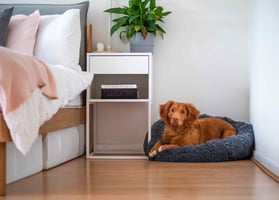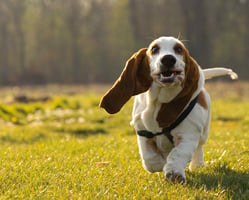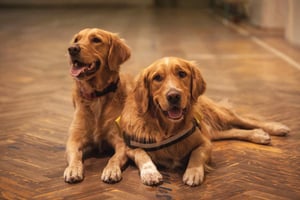Keeping your furniture safe from a teething puppy can be a daunting task. Fortunately, there are...
How to Stop a Puppy from Being Aggressive
Puppies are adorable and loving animals, but sometimes they can display aggressive behaviour. This can be worrying for owners and can even be dangerous for other people and animals. Fortunately, there are steps you can take to prevent and stop your puppy from being aggressive. In this article, we will discuss how to identify the causes of aggression in puppies, how to intervene when it occurs, and how to prevent it from happening in the future.
Identifying the Causes of Aggression in Puppies
Puppies can become aggressive for a variety of reasons, including fear, anxiety, lack of socialisation, and a lack of proper training. It is important to identify the cause of the aggression so that you can address it appropriately. Here are some common signs that your puppy may be feeling fearful or anxious:
- Barking, growling, or snarling
- Showing their teeth
- Lunging or biting
- Cowering, tucking their tail, or hiding
It is important to remember that aggression is a sign that something is wrong and should not be ignored. Taking the time to identify the cause of the aggression and address it can help to prevent it from happening in the future.
Intervening When Aggression Occurs
When your puppy displays aggressive behaviour, it is important to intervene quickly and calmly. Here are some tips for intervening when your puppy is being aggressive:
- Remain calm and don’t shout. Yelling can make the situation worse.
- Move away from the situation and give your puppy some space.
- Avoid making eye contact with your puppy and avoid touching them.
- If possible, distract your puppy with a toy or treat.
It is also important to remember that you should never punish your puppy for being aggressive. Punishment will only make the problem worse and can lead to further aggression in the future.
Preventing Future Aggression
Once you have identified the cause of aggression in your puppy, you can take steps to prevent it from happening in the future. Here are some tips for preventing aggression in puppies:
- Provide plenty of socialisation opportunities. Socialising your puppy with other animals and people will help them to become more comfortable in new situations.
- Provide plenty of exercise and mental stimulation. A tired puppy is less likely to be aggressive.
- Teach your puppy basic obedience commands. This will help them to learn how to behave in different situations.
- Provide a safe space for your puppy. A quiet space where your puppy can go to feel safe can help to reduce anxiety and fear.
It is also important to remember that puppies can be unpredictable, so it is important to be aware of your puppy’s behaviour and intervene if necessary. Taking the time to identify the cause of aggression and address it can help to prevent it from happening in the future.
Conclusion
It is important to remember that aggression in puppies is not normal behaviour and should be addressed quickly and calmly. Identifying the cause of the aggression is the first step to preventing it from happening in the future. Taking steps to socialise your puppy, provide plenty of exercise and mental stimulation, and teach basic obedience commands can help to reduce the chances of aggression occurring. With patience and consistency, it is possible to stop a puppy from being aggressive.



